PRE-ISSUE SEOULITE


XXV
SEOULITE CONTRIBUTORS 2022
Editors-in-Chief
Aimee Choi, Rosa Suh
Managing Editors
Clair Kang, Grace Lee

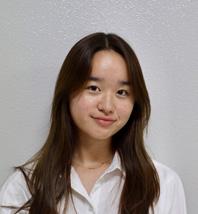


















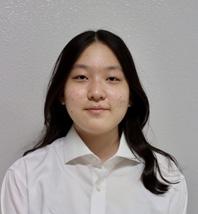

Copy Editors
Lauren Kim, Chelsea Kim


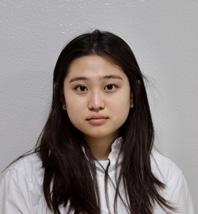


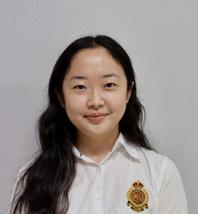

Layout Editors


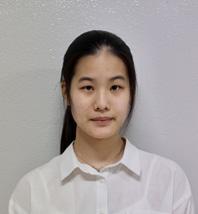
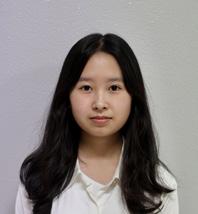
Yuzine Yi, Eunice Rhee
Photo Editors
Alice Lee, Chloe Cho
Copy
Sean Kim, Ellen Park, Jiyu Hong, Lin Chi ang, Jason Lee, Lucy Jang, Charlotte Jun, Jennie Koh, Kris Son, Sophie Choi
Layout Photo
Edward Yoon, Yujin Joe, Kaylee Kim, Ellen Ryu, Luna Moon, Silvia Lee, Hannah Kim
Julie Koh, Dana Chung, Kristina Kang, Bel la Youm, Celine Yang, Jasmine Cho, Anna Lee
Advisor
Ms. Wendy Grant
LETTER FROM THE EICs
Honorable delegates, chairs, advisers, and guests,
We are honored to serve as the editors of Seoulite, the official press publication of SEOMUN. We would like to celebrate delegates and chairs for attempting to tackle the most urgent issues in an ever complicating world and organizers for creating the space necessary to do so. Though SEOMUN may merely enact the events of a UN conference, it sparks the same dedication for making the world a better place.
This year’s theme, Bonds of Unity, says—whether through globalization, the Internet, or even common interests—that we are more connected to others than what we may usually think.
Journalism has been one of the most pervasive ways of reminding us of this shared humanity. For the last three years, Seoulite has brought together delegates separated by the pandemic and combined their stories on the same page. We hope that, with the four issues Seoulite will publish throughout the conference, we will once again remind you that even separated by im mense distances, all delegates share the same zeal for the betterment of the world.
We would like to ask the delegates and chairs for two things:
First, please take the time to look through our daily issues on issuu.com. We promise to fill its pages with diverse and engaging content ranging from debates being passed in GA I to which songs best represent SEOMUN.
Second, if a press member approaches you for an interview, please spare a few minutes. We will try our best to request a non-invasive time, but on rare occasions that might not be possible. We welcome your uncensored and personal opinions!
We wish all delegates the best of luck. Happy SEOMUN XXV!
Aimee Choi & Rosa Suh Co-Editors-in-Chief

JUKEBOX JEWELS
SEOMUN XXV: THE TUNE OF A BROKEN RECORD PLAYER
Alongside every annual return of SEOMUN, a great wave of panic, exhaustion, and apprehension among the participants never ceases to exist. But with this enervation also resides a sense of relief and satisfac tion—after all, participants spend an immense amount of time repeatedly reviewing and perfecting their res olutions, and through SEOMUN, they finally are able to showcase their efforts and mark the official end to their strenuous MUN journey of the year. This emotional roll ercoaster can be better depicted through the language of music than through words, so Seoulite has prepared three songs to provide a glimpse into the inner mind and sentiments of a SEOMUN participant.
Never Give Up - Sia

“Never Give Up” by Sia is a reminder to embrace obstacles and main tain resilience. This is a message most MUN participants find them selves frequently coming back to as they progress through numerous difficult days that make them reconsider the true value of MUN and whether or not it is worth the psychological strain. MUN can be vastly overwhelming at times, but with Sia’s comforting melody softly play ing through the participants’ earphones, Seoulite hopes that partici pants will be able to persist and successfully fulfill their MUN duties.

Count On Me - Bruno Mars
Bruno Mars’ “Count on Me” embodies the camaraderie, teamwork, and friendship MUN delegates portray throughout all of SEOMUN. The song represents how at the end of the day, friends help each other through good times and bad, putting the competition and ac ademic stress behind them. Though MUN can be chaotic and pres suring most of the time, delegates know that they can count on their friends in any situation. The song also serves as a comforting remind er to new MUN members that may feel lonely and intimidated by the entire MUN process and reassures them that they will encounter amazing teammates and friends along the way.
I Ain’t Worried - One Republic
This upbeat, summer-vibe song by One Republic carries the meaning of how a person surrounded with concerns should not be worried. The song emphasizes how it is crucial for one to maintain a positive attitude and mindset because time is running out, and no moment lasts forever. “I Ain’t Worried” can be applied to MUN delegates, be cause though it is important to produce effective resolutions and receive Best Delegate awards, participants should also enjoy the op portunity they are presented with, and refrain from being pessimistic.
 Ryu
Ryu
4
Written by Chelsea Kim, Lauren Kim
Layout by Ellen





Seoulite XXV Pre-Issue 5
STUFF DELEGATES SAY Search
Written by Ellen Park Photo(s) by Anna Lee Layout by Eunice Rhee
SEOMUN XXV CELEBRATES BONDS OF UNITY

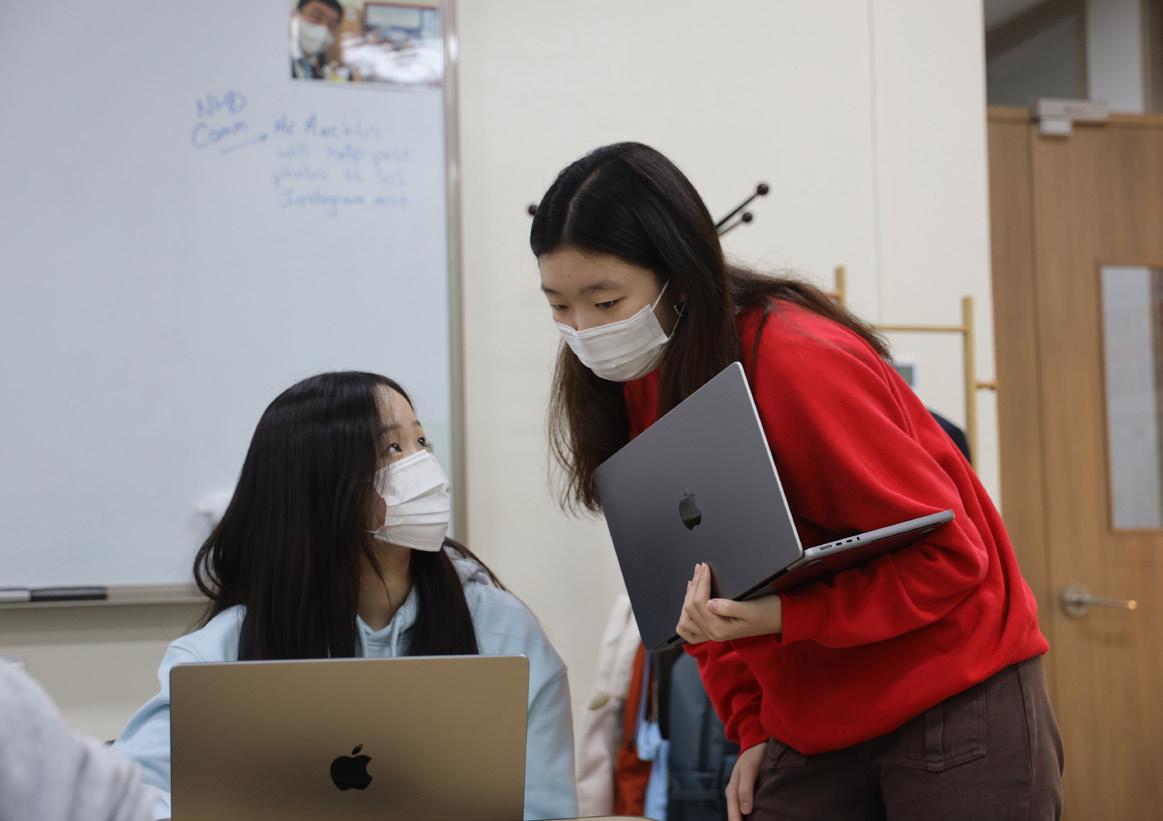
This year’s theme for SEOMUN XXV is Bonds of Unity. This theme will dictate the direction of the conference and in form delegates about the top priority in the current world. Bonds of Unity, like past themes, encourages discussion on many current events such as war, government corruption, economic recession and more.
“I believe the theme this year is symbolic for collaboration in the international com munity—especially because of the current Russia-Ukraine war crisis,” said Eddie Chu, the delegate of Germany in the United Na tions Human Rights Council. “This theme is particularly crucial right now because it reminds us of our heritage and reminds us of how much progress we have made as a collective group of people, each with inno vative ideas.”
Delegates and chairs from different committees seem to strive for the ulti mate goal of unity, yet by taking different approaches. Women’s employment and political participation, ocean acidification, and protection of refugees from sexual as sault are just a few examples of the diverse agendas raised by the committees.
“All agendas are ultimately connected to this year’s SEOMUN theme of Bonds of Unity as all chairs were required to explain exactly how their agendas were related
to it when writing their chair reports and finalizing their committees’ topics,” said Junseo Lee (11), the Deputy Assistant Pres ident in the Environmental Commission. “Being a chair for my committee, I am nat urally most interested in various environ mental issues such as deforestation, nucle ar energy, and ocean acidification.”
Bonds of Unity can be reinterpreted in many ways, as most themes can. For in stance, it can point to key international relationships in the world, the Sustainable Development Goals and Millennium De velopment Goals, and even global crises like COVID-19 and climate change. None theless, delegates take away the same lesson: the importance of unity in times of global challenges.
“Bond of Unity is important in the cur rent state of the global world as many of the challenges countries face can be solved through collaboration between countries,” said William Park (9), the del egate of Argentina in the Economic and Social Council. “If countries do not unite to solve any issues or challenges we face, the world will surely face more issues in the fu ture.”
6
Written by Jiyu Hong
Photos by Kristina Kang Layout by Kaylee Kim
SECRETARY GENERAL GRACE AN REFLECTS ON HER MUN JOURNEY
Everyone’s first MUN conference is difficult, and it might be strange to think that one can grow from such an inexperienced candidate to a chief secretari at within just a few years. Such was the case for Grace An, a senior at Seoul Foreign School (SFS), who will serve as the Secretary-General for the 25th SEOMUN conference, responsible for monitoring all staff and organizing the entire event. When first joining MUN four years ago, Grace would never have guessed that such a crucial role would be offered to her.
“When I first joined the beginner MUN track at my school, I was completely lost,” Grace said. “The THI MUN rules of procedure, MUN language, and debate format seemed so confusing. MUN really humbled my confidence for debate that I had from previous experiences as an Asian and British parliamenta ry-style debater.”
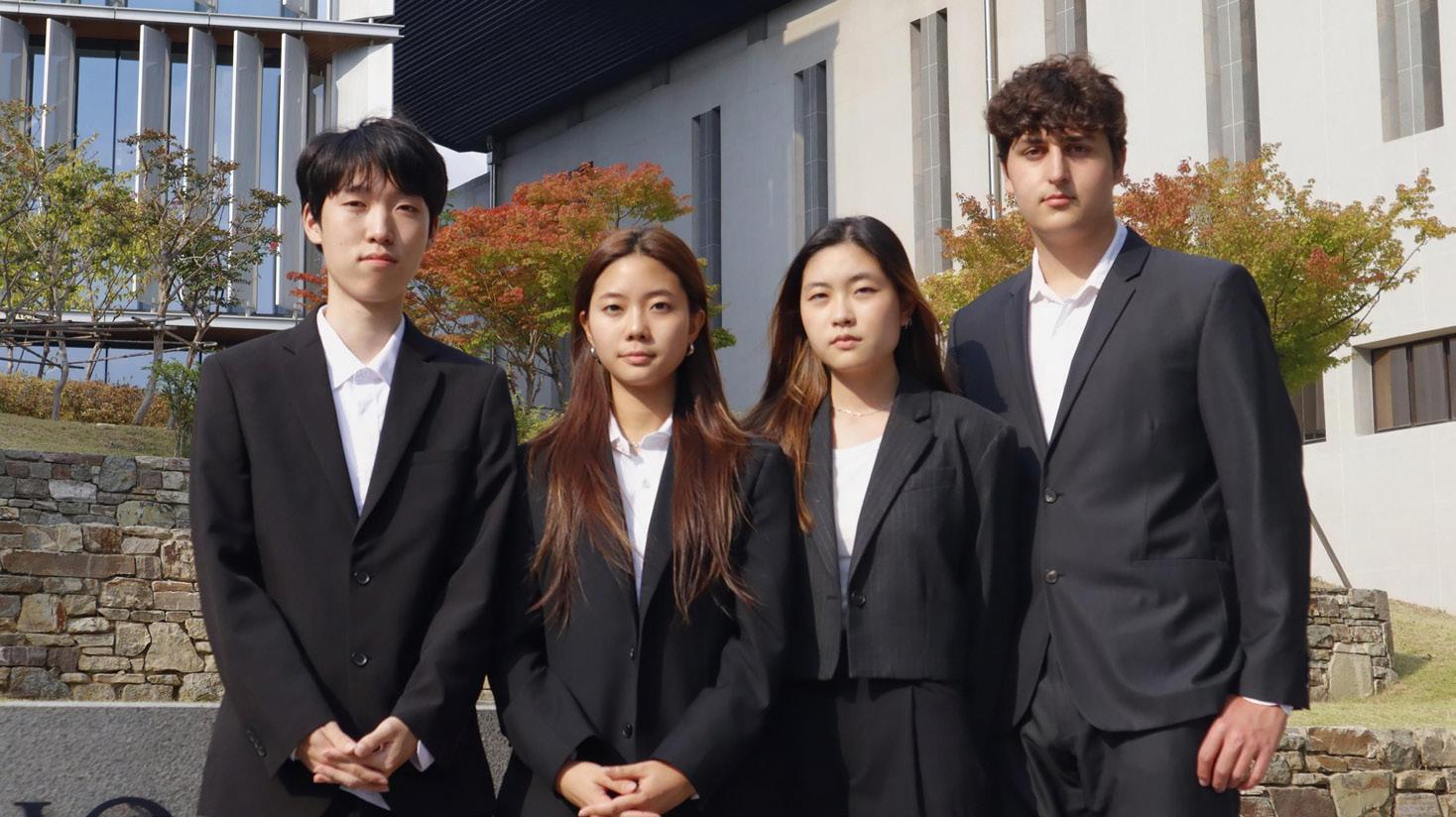
During her first MUN conference, Grace was ner vous at the exposure to a foreign style of debate. Since it was Grace’s first time debating in such an unfamiliar setting with a large group of people, she was prone to stuttering and making frequent pauses when speaking. Most MUN delegates can probably relate to the emotions that Grace felt at her initial conference—anxious, confused, and scared. It is nat ural to feel lost whenever one is faced with new ex periences, but as these experiences accumulate, one can learn and grow.
“The key to a successful MUN experience is pas sion,” Grace said. “I know this sounds pretty cliché, but it is hard to persist through the challenging MUN journey without having fun. Although there were 7-8 hours of homework every week throughout my first two years of my MUN experience, simply en
joying the process was enough to keep me actively learning.”
Grace was able to improve and learn throughout her MUN experience solely because she truly enjoyed participating in the events. Had she been forced to attend meetings and speak about issues she was not interested in, she would not have grown as a debat er. This was her most valuable takeaway—in order to improve and get the most out of an experience, one must truly have a passion for it and a desire to learn.
“As one of the few people who started MUN in high school instead of middle school, my experience with MUN was tough,” Grace said. “Seeing myself in the position of Secretary-General is like the final re ward to my journey, which was a valuable learning experience that taught me the power of persever ance and passion.”
Now, after all those hardships and learning expe riences, Grace will conclude her high school MUN career as Secretary-General. This means she has a crucial role to play in this year’s conference, which she is grateful for. As the Secretary-General for this year’s SEOMUN conference, Grace has some words of advice for current delegates that may succeed her role in later years.
“MUN is not only about your knowledge on poli tics, international relations, public policy, and so on,” Grace said. “MUN is more about personal growth and determination. So don’t doubt yourself, and remem ber that ‘it’s hard to beat a person who never gives up.’”
Layout by Kaylee Kim
Written by Sophie Choi
7
HOW DO YOU LOOK LIKE AN EXPERIENCED DELEGATE?
Whether it is the first conference or the ninth conference, delegates always need to be prepared. That can differ whether they look experienced or not. The SEOMUN conference had many interesting things shared, but one thing that stood out was whether a delegate looked experienced or not. There are many features that can make a MUN member look experienced.

Carey Kim, delegate of Argentina in the Environmental Programme (ENV), said that she can clearly tell whether someone is experienced or not when a delegate is struggling to answer a POI, a question that another delegate asks the delegate who is speaking. This means that as an experienced MUN member, quick reflexes are of utmost importance so they can keep their compo sure on the podium.
“Whenever I’m at a conference, I always notice that an experienced MUN member has quick reflexes,” said Carey. “You can see this clearly when they answer POIs. Because of this, I usually try to think of what questions they would ask when I’m on the podium.”
On the other hand, William Park, delegate of Argentina in the Economic and Social

Council, has learned a lot from the exec utives. Now that William has experienced what it is like being in high school MUN, others take inspiration from him. He learned a lot and now is passing that knowledge to other delegates.
“What makes me a good MUN member is that I have done this before and also he is influenced by others,” said William. “An exec utive member that I am close with is really good at MUN and he really influenced me.”
But according to Paul Moon, delegate of Israel in ENV, the effort someone puts in al ways shows how experienced a delegate is. As one of the executives in the MUN Club, Paul knows that even if a delegate has been to only one conference, if that delegate puts in that much effort, they will seem like they have been doing MUN for years.
“I don’t think that it’s the number of con ferences that you have been in,” said Paul Moon, an MUN executive. “I think it based off of how much effort you put into trying and practicing a lot. No matter how many confer ences you have been in, effort and practice always kick and beat everyone else.”
8
Written by Sarah Kim Photo(s) by Bella Youm Layout by Eunice Rhee
MUN NEWBIE FEATURE: JIAN HONG
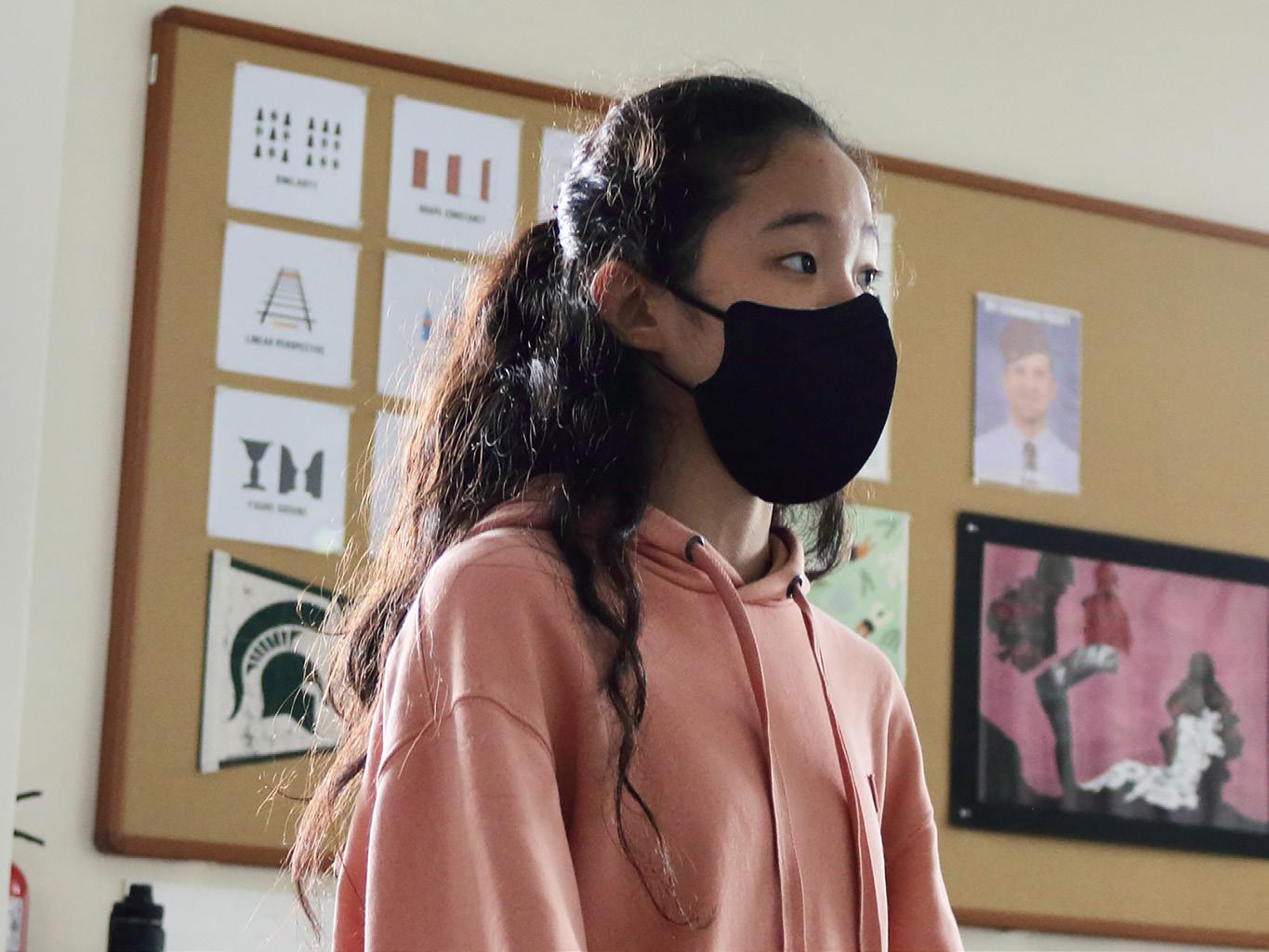
Entering high school, being a part of MUN is one of the monumental changes in many domains for freshmen. Veteran MUN members are aware of the expectations, but for newcomers it is a challenge they must overcome. Jian Hong is a freshman MUN member representing Argentina in the Unit ed Nations High Commissioner for Refugees. Jian voiced her opinions on MUN represent ing the freshman newbies, and how aca demic simulation has been influencing Jian’s freshman year so far. One of the new chang es about MUN from middle to high school was that now in high school, there are up perclassmen who can guide them through being much more experienced members.
“I think, in the beginning, it was hard to ad just because the upperclassmen were much more experienced and the classes were pret ty fast-paced.” Jian said. “But after I went to the first conference of the year and we broke down the classes for a general schedule, I think we got a lot more in-depth feedback and practice. Being new to anything is pret ty nerve-wracking, but MUN is something that I’m really enjoying right now and all the execs and upperclassmen are really friendly and helpful, so I think I’m doing well so far!”
Through talking with freshmen, the up perclassmen further establish leadership skills and also allow the younger members to learn more about MUN and receive mean ingful feedback. In contrast to her past ex periences with MUN in middle school, there were longer and more professional debates and stricter deadlines in high school. MUN was nerve-wracking and fast-paced for the freshmen, making it hard for them to keep up. Jian, however, wants to overcome these struggles.
“One struggle for me was when I wrote my first draft resolution.” Jian said. “It had many flaws, and although it wasn’t fully complete, I felt proud of myself when I was done. Drafting resolutions after that initial break through also became a bit easier, and I think it’s also because the club environment is re ally welcoming to mistakes and constructive feedback.”
Jian expressed that the first draft did not go ideally, which shows that not everything started off swiftly. Jian was not the only fresh man who experienced hardships during MUN. Yeonjae Kim, delegate of Germany in the Committee of the Status of Women, also expressed that she faced challenges.
“I think the challenges of being in MUN as a freshman is that there’s a lot of pressure to be proficient at public speaking and to know a lot about topics occurring in the world,” Yeonjae said, “Also, there are mandatory con ferences we have to attend, and for people like me, I don’t have a lot of MUN experience, which makes it a bit hard for me to partici pate comfortably. However, it is also very ex citing to talk to new people about different issues that are prevalent in the world.”
9
Written by Ellen Park
Photo(s) by Anna Lee Layout by Eunice Rhee
ECONOMIC GLOBALIZATION BINDS NATIONS

Nations around the globe are connected politically and economically. As a result, the integration of countries’ economies ultimately boosts the well-being of all nations. Because the current global trade systems and interdependence between different nations are rising, economic globalization is crucial in addressing this. According to Statista, leading countries in the Globalization Index field of economic globalization 2021 include Singapore with 94.28, the Netherlands with 90.12, and Belgium with 88.75 index value in points. These points evaluate the effectiveness and frequency of practicing economic globalization. These countries demonstrate substantial amounts of trade in goods, technology, ideas, and migration for labor, which all define economic globalization. Overall, this connection of the world encompasses economic growth and benefits citizens.
Recognizing the importance of economic globalization is essential for the growing trade market and various industries. Companies that mass produce goods, especially take advantage of this globalization because labor can be costly when manufacturing goods continuously. The labor costs decrease as different parts of the product can be manufactured in countries that have cheaper labor costs. Although this leads to poverty and wider social stratification among those nations, this process ultimately provides profit and productivity for companies that utilize this labor, as well as the economic prosperity of the nations that produce these goods. This corresponds to the longevity of electronic producers such as Apple, as they assemble most of their products in India and China. According to Green America, the labor per piece of assembling their product costs only $0.27, but would presumably be higher when assembled in a country with a higher minimum wage, like the United States. As a result, on August 2, 2018, Apple made history as the first publicly traded U.S. company to value at $1 trillion. In other words, Apple’s success and remarkable margins are directly parallel to the usage of cheap labor. If economic globalization was not thriving, the main contributor to America’s economy would not have been able to break records.
However, companies practicing economic globalization experience drawbacks as a side effect. Though it may not be apparent in contemporary society, the environmental concerns from mass production and transportation to foreign countries have serious long-term implications. Companies’ increasing numbers of infrastructures impact our environment, leading to deforestation and loss of biodiversity. Additionally, in the process of transporting goods, greenhouse gas emissions may increase. This contributes to the detrimental effects of pollution on our environment is gradually
starting to show.
Furthermore, the benefits of globalization also apply to the consumers of companies that utilize low labor costs, especially individuals from lower societal classes. Most companies match their price point for their products in correspondence to the production costs, unless they max out on their profit maximization. Although it depends on the industry, if the costs of production decrease, then the items would also drop in price. As a result, individuals of lower socioeconomic status would take advantage of lower prices. Not only would this be appealing to a wider audience, but it would also lead to better standards of living as they could save money to spend on other necessities. For instance, the reason why thrifting, or reselling, is an exponentially growing, multi-billion-dollar-a-year industry with more than 25,000 resale shops in the U.S. is that people of the lower class have access to clothes much cheaper than branded ones. Instead of spending money on similar quality clothes, they could buy food or save up for low-cost housing. Thus, like the producers, the consumers in the lower classes would also seek benefits.
On the other hand, the drawbacks of economic globalization limit its growth. Although the producers of goods and consumers of the lower class benefit from this globalization, other nations get impacted due to job loss. The developing countries have a growing number of workers for major companies. However, the workers in the labor field of developed nations, like the United States, are losing their jobs to such lower-wage workers. From the company’s perspective, it is significantly more profitable to use employees in China or Bangladesh as they have lower minimum wages. If economic globalization was not present, this competition for the workforce would not be present. Ultimately, this situation causes economic instability due to rising unemployment rates. More specifically, within the years 2000~2007, there were 800,000 manufacturing jobs lost in the U.S. due to increased Chinese competition. Hence, globalization’s flaws should not be overlooked as many are impacted at the cost of improving the well-being of the lower classes.
Having an open eye to the recent increase in economic globalization is critical in achieving a middle ground between the benefits and drawbacks. Major companies today take advantage of this escalating interdependence of economies around the world. The contradictory cycle of the lower class needing cheaper products but also needing jobs that are taken away by developing countries requires a solution for world economic growth. Doing so will address global debt and inflation for the betterment of all nations, no matter thriving or recessing.
10
Written by Charlotte Jun Layout by Luna Moon
IMPACT OF CULTURAL GLOBALIZATION ON ADDRESSING GENDER INEQUALITY
Britannica defines cultural globalization as the “phenomenon by which the experience of everyday life, as influenced by the diffusion of commodities and ideas, reflects a standardization of cultural expressions around the world.” The purchase of new clothes that were made in India, snacks that were imported from the United States, and even pens that were mass-produced by Chinese manufacturers, are all indications of how society has grown to be characterized by a globally integrated economy and culture. In an ever-evolving world like the current society, it is important to note that sectors requiring extensive cognitive skills, such as financial services and e-commerce, are becoming increasingly important. The pervasion of different cultures and ideas all around the world has brought forth more discussions on the necessity of gender equality in the workplace in order to increase the number of skilled workers, emphasizing not just the significance of having females in the workforce, but noting that doing otherwise is an impediment to development.


It is evident that not adopting more progressive views on gender equality limits a country’s ability to compete on a global scale compared to other countries that have accepted these ideas. Countries with fewer women contributing to the workforce typically have a lower income and poorer advancement than countries where women are actively working. This is largely attributed to the limited educational and economic opportunities for women in those countries, which results in less skilled workers in the workplace. The lack of viable workers can negatively impact the country’s economy and development, signifying the need for gender equality in these places.
Fortunately though, according to the
World Bank, the widespread advancement and diffusion of information and technology have allowed women to have increased access to economic and leadership opportunities, promoting change among people in regard to attitudes about women in the workplace; however, changes in attitudes are not limited to just the workplace. Entire countries that have not ratified treaties against gender discrimination or generally have negative inclinations about women have experienced international peer pressure from more progressive countries to fix these attitudes and realize the surging value of female labor, especially with the notion of brains being a better hiring determinant compared to brawn. Cultural globalization has also led to more media exposure of different places, allowing countries to have more access to what is happening in other parts of the world and learn from their successes and failures, and more importantly has encouraged consumers to demand better working conditions and wages for women.
Although there have been strides made in effectively incorporating women to have an equal role in the workforce, there are still many more steps needed to ensure that these developments are permanent and the efforts are continuous on an international level; the International Labor Organization has even estimated that the global participation of women in the labor force has been declining during the past few decades to just below fifty percent before the pandemic. Therefore, in order to combat these lowering numbers, the United Nations Division for the Advancement of Women proposes that greater operational, policy and normative work must be conducted in order to further promote gender equality and determine future actions and initiatives.
11
Written by Jennie Koh
Layout by Luna Moon
WHAT ARE YOU MOST ANTICIPATING FOR SEOMUN?
Every year around this holiday season, MUN delegates are elated for an event they have been strenuously preparing for months: SEO MUN. A sense of ambivalence arises in the MUN conference rooms for all delegates, including newcomers and senior delegates, who all want to participate in unforgettable experiences.
“It is my first time being a chair at an official MUN conference,” said Eric Hyunseung Cho, Deputy Assistant President of the Six-Party Talks. “During the summer, I wrote my chair re port about implementing measures to prevent the escalation of territorial disputes in East Asia, and I am excited to see delegates debate on the topic I deeply researched.”
Since the pandemic breakout, the virus has physically disconnected everyday activities to such a great extent that online and virtual events now bring a greater familiarity than of fline events. Likewise, because SEOMUN has been held online for the past two years, dele gates have inevitably adapted to raising hands, unmuting their microphones, and sending private messages instead of going to the podi um and engaging in face-to-face interactions with other delegates during lobbying sessions. However, some delegates reminisce about the treasures of offline conferences, particularly the lively conversations and public speaking experiences.
“It is my first offline SEOMUN conference ever since I started MUN in eighth grade,” said Danny Han, delegate of Argentina in Gener al Assembly I. “When I first found out about MUN, I was most excited about the fact that I would be able to meet delegates from all over the world; however, the pandemic crushed my
hopes, and I am relieved to see social distanc ing restrictions lessening each day.”
Other than the social aspects of SEOMUN, some delegates are thrilled to experience the academic aspect of the conferences, as dele gates are granted the opportunity to present their carefully crafted research and resolutions. For instance, Jian Hong, delegate of Argentina in the United Nations High Commissioner for Refugees, displays exceptional excitement for the golden real-life experience at a MUN con ference, cherishing the opportunity to propose solutions for international humanitarian issues.
“The biggest thing that I’m looking forward to at SEOMUN is the debate because I think all the committees and the agenda are relevant and important to modern society,” Jian said. “One thing I enjoy about MUN is the diverse in ternational issues we tackle, and I can see that SEOMUN is already covering so many topics on that!”

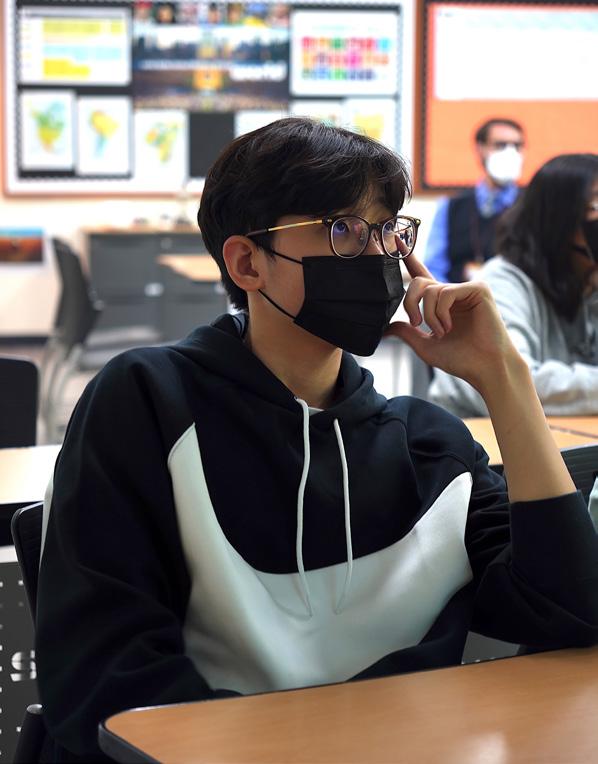
As delegates are marking off their calendars and adding the final touches to their resolu tions, they are exhilarated for diverse reasons; regardless, there is one similarity that all dele gates have: a hope for a fruitful and enjoyable conference.
Written by Lin Chiang Photo(s) by Teresa Chang Layout by Yujin Joe
12
WHAT DO YOU LIKE MOST ABOUT YOUR COMMITTEE?
During a MUN conference, forums em ulate those of the real United Nations. These forums are called committees, which include the General Assembly (GA), the Eco nomic and Social Council (ECOSOC), and the Environmental Commission (ENV). The del egates and the chairs of these committees always put in their best efforts to make the most out of conferences, creating a fun yet productive time for everyone. Whether it is the cozy atmosphere that makes the com mittee an enjoyable place to share one’s thoughts, or an agenda that delegates are passionate about, each MUN delegate has certain aspects that they most like about their committee.
Delegates must respectfully and patiently work with each other in order to come up with a resolution. This process looks differ ent for committees depending on their size. Bigger committees tend to be more fond of the things they are able to do with a larger number of people, while smaller commit tees highlight a friendly atmosphere, allow ing delegates to speak up more often.
“I was also in the Environmental Commis sion last year,” said Katelyn Oh, the President of ENV. “I found that a fewer number of peo ple compared to larger committees such as the General Assembly contributes to a cozy atmosphere that helps delegates raise their voices.”

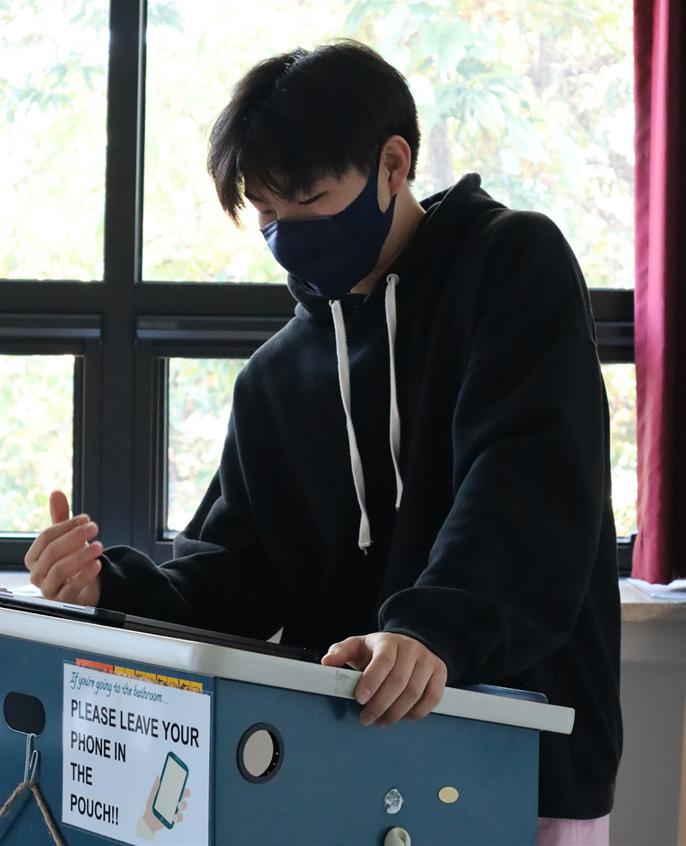
Apart from the variety of types and sizes among different committees, the nature of the debates themselves is another aspect
that delegates appreciate. Because dele gates strongly believe in the importance of the issue they are standing for and wish to get a specific message out there, it is import ant to them that their committee involves smooth and productive debates.
“I like that the operative clauses and the resolutions in the United Nations High Com missioner for Refugees (UNHCR) can get re ally specific, especially when we are talking about programs for refugees, and I feel like this is also what makes the debate much more exciting,” said Jian Hong, the delegate of Argentina in UNHCR. “Because I am inter ested in helping refugees, I think it is really interesting to hear delegates talk about the solutions they can bring to the table.”
Jian further explains how the way mem bers interact with one another is another important factor that determines how en joyable the experience is.
“Especially in UNHCR, I feel like delegates are much more respectful,” Jian said. “Since we are tackling such a sensitive issue, dele gates are careful about how they treat each other, and the way that certain speeches are made so that nothing is directly attacking any country.”
From the size of their committee to the personalities of fellow delegates, there are many aspects that different members like most about their committees. With these in mind, delegates are launching the 25th an nual SEOMUN with a positive outlook.
13
Written by Lucy Jang
Photo(s) by Dana Chung
Layout by Yujin Joe
WHAT IS YOUR GO-TO SPOT TO ATTEND ZOOM IN SCHOOL?
As the 25th iteration of SEOMUN draws ever near, one unfortunate prospect remains—the fact that the conference will continue to be held online via Zoom. Despite this, the loosening of pandemic restrictions has allowed for delegates attending the conference to set themselves up at school in an on line-offline hybrid environment. With this situation, an interesting problem arises, as students must find a suitable environment on campus where they can maintain their focus throughout the long confer ence.
Whether it be in a cozy pile of bean bags to the mundane chair-and-desk setup that all students have grown accustomed to, every delegate has their preference as to where they like to attend on line conferences. Some tend to err on the side of comfortability, accounting for the long hours they will have to remain seated at a computer.
“I generally like to set myself up in the corner of my assigned room, along with a few bean bags or blankets if there are any,” said Danny Han (10), del egate of Argentina in the General Assembly. “Along with comfort, I also make sure to have some peace and quiet in my room so that I can hear the voices of other delegates through Zoom and concentrate.”
For every delegates’ preferred work location, though, there tend to be those that are the exact opposite. Though potentially uncomfortable, many delegates place themselves in an academic location to try to work in environments that maximize their productivity. “I like to set up in a traditionally aca demic environment, as it helps me focus and get in
my zone,” said Eric Kim (10), delegate of Germany in the World Health Assembly. “If I set up more infor mally, then it makes it more likely that I am going to go off-task and become unfocused during the tour nament, which would hinder my performance.”

Sometimes, though, delegates are not looking at the intrinsic quality of a location when finding a spot for SEOMUN, but rather its proximity to other locations. Because one of the key aspects of any conference is discussing with one’s peers and creat ing new connections throughout the tournament, the relative location of a go-to spot is also highly valued.
“I like to strategically set myself up near people who are in the same committee as I am so that we can discuss the conference as it happens,” said Wil liam Park (9), delegate of Argentina in the Economic and Social Council. “Doing so helps me stay focused and also makes the conference more fun since we can all discuss with each other.”
Ultimately, there is no one uniform answer as to where the best spot in the school to attend SEOMUN is, or even a consensus on what defines a good spot. However, it is clear that SIS’s campus offers many niche spots, all with wildly different characteristics that appeal to different delegates depending on what they are looking for.
Written by Jason Lee
Photo by Bella Youm, Jasmine Cho Layout by Edward Yoon
14
WHAT IS THE MOST INTERESTING THING ABOUT THE COUNTRY YOU ARE REPRESENTING?
At this year’s SEOMUN, students are acting as the delegates of a country in the United Nations as always. Just as each delegate is notable, so are the countries they are representing. Three delegates, Seungwoo Oh, Jian Hong, and John Kim are avid MUN members who each have their own favorite quirks about their assigned country.
Some delegates discover fascinating facts when they take a deep dive into their country’s history, with many finding their country’s political and war history as the richest and deepest aspects of their respective countries. Seungwoo, the delegate of Turkey in the World Health Assembly, is a great ex ample of those interested in historical matters like the ethnic dispute between the Kurds and Turkey.
“I find that particular disagreement interesting along with the fact that this led to a conflict between Turkey and the Kurds,” Seungwoo said. “Another in teresting tidbit is that even though the Kurds rep resent a third of Turkey and wish for independence, Turkey has refused to give them independence since 1978. Hence, a war broke out that has taken the lives of 40,000 citizens and still continues to the present day. I hope to create a resolution with my fellow delegates to resolve this conflict once and for all.”
Meanwhile, delegates such as Jian Hong, the delegate of Argentina in the United Nations High Commissioner for Refugees, find themselves drawn more by the modern culture of their countries. Al though her country, Argentina, is famous for its soc cer team, music, and wine, she has found interest in
her country’s development in animation.
“The first animated film in the history of anima tion was created in Argentina,” Jian said. “I thought it was really intriguing because anime is a huge part of Gen Z kids’ lives, and I find it interesting that it was first pioneered in Argentina and not in a more developed nation like the US or Japan.”
Finally, John Kim, the delegate of Poland in the Environmental Commission, found himself drawn more towards Poland’s efforts to research and eradicate climate change and solve environmental issues. So far, Poland has already enacted policies that are helping the Earth.

“I think the most interesting aspect of Poland is that it is one of the leading countries in the issue of environment,” John said. “It has made a significant amount of progress in reducing greenhouse gas emissions so I think Poland is one of the exemplary countries that has made a lot of progress in terms of effective eco-friendly regulations.”
It takes a lot of research and preparation for dele gates to accurately represent their designated coun tries and its respective values in SEOMUN. Though often a time-consuming process, delegates have the privilege of learning fascinating facts and quirks about their countries. Using this, they expand their knowledge of the world and become more globally aware citizens.
15
Written by Sean Kim
Photos by Anna Lee Layout by Edward Yoon
ESSENTIAL ROUTINE/RITUALS DONE BEFORE ATTENDING MUN CONFERENCES
Whether

the conference is held I or offline, delegates still have their personal rou tines that they follow before attending MUN conferences. The delegates and the chairs have routines that they follow before attending con ferences. SEOMUN, a simulation of the United Nations conference led by students of inter national schools in Seoul, is one of the largest MUN conferences held in Korea. The online ver sion of SEOMUN has taken place for two years since its inception in 2020; delegates, in re sponse, have their routines that they choose to go through before attending the conference.
The MUN conference that delegates perform is outstandingly realistic; therefore, the dele gates need to prepare themselves with some thorough research for the debate. During the conference, topics requiring extensive re search are discussed; therefore, before the debate, delegates need to have fundamental knowledge and understanding of the coun tries they have been assigned and the com mittees to which they have been assigned. The thoroughness of a delegate’s research decides how often they get to speak and how well they can argue for the specific resolution.
“Research is one of the most important things to prepare ahead of a MUN conference,” said Daniel Shin, the President of the Commis sion on the Status of Women. “It not only helps the delegates to be more well-versed in their agenda but also be able to use it to their ad vantage when making speeches, POIs, and drafting resolutions and amendments. Further more, preparing statistics and sources can be a potent tool when making a compelling speech”.
While extensive research is needed for the delegates in preparation for the conference, the preparation process differs for the student officers. The conference’s leaders hold much more responsibility than the delegates. Most of the tasks that the chairs are responsible for are finished months before the conference so that they can prepare the procedures to make the conference aencouraging for the delegates.
Most of the tasks that the chairs are re sponsible for are finished months be fore the conference so that they can prepare the procedures to make the con ference aencouraging for the delegates.
“Unlike delegates, we need to familiar ize ourselves with the Rules of Procedures and learn how to facilitate debate, as well as writing chair reports,” said Junseo Lee. “Additionally, most of the preparation was completed during summer break, when we needed to follow strict deadlines to meet the requirements for being a chair at SEOMUN.”
Though SEOMUN recently has been convert ed to an online conference, the process has not considerably changed. The preparation process for online and in-person conferences is quite similar. While the delegates need to have a structured understanding of their countries and the topic of the conference, the chairs need to have the rules of procedures learned to lead the conference. What both groups miss is the at mosaphere of the actual conference, however.
“The online conference and the offline con ference are pretty similar,” said Jordan Kim, the President of the United Nations High Commissioner For Refugees. “However, most chairs and delegates do miss the feeling of being in the same room as other individuals and debating directly, which is why many of us hope that SEOMUN and other conferences will be available offline by the end of this year.”
16
Written by Kris Son
Photo by Celine Yang
Layout by Silvia Lee
SEOMUN Crossword SEOMUN Crossword ACROSS 3. Use this word instead of personal pronouns 8. Document around which debates are centered 9. What delegates can either take or yield 10. Committee based around the problem of North Korea’s nuclear weaponry DOWN 1. Each committee usually has three of these people 2. Overseers of the conference 4. Platform that publishes Seoulite issues 5. Those who facilitate communication among delegates 6. Period when informal language is acceptable 7. Committee just one-year-old at SEOMUN 1 2 3 4 5 6 7 8 9 10 17
Written by Aimee Choi, Rosa Suh
Layout by Yuzine Yi
SEOULITE PRE-ISSUEXXV







































 Ryu
Ryu



















